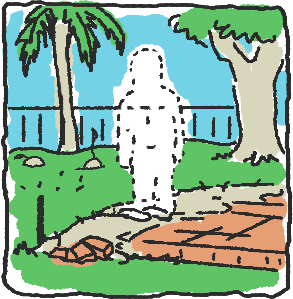 He was dead. The backyard was overgrown. The palm trees had dropped their coconuts, leaving them to sprout helpless in the tall grass. We texted and our other neighbors texted, but there was no answer. My next door neighbor was gone. Extending from the back door of his house to the center of the backyard was an unfinished brick patio, capped by a pile of sand and scattered bricks. It will probably never be finished. I looked at the pile of sand, with tufts of grass peeking through. There, atop the matted down hill were light impressions, the spot where my neighbor had stood, speaking loudly on his phone in a clear Colombian Spanish, mere weeks before. He will never again stand in his backyard. He will never again wave to me, and ask in his best English, “How you are, Jon?” Now his life, for me, is just a light impression in the sand of an unfinished patio project. The darkness of death has overtaken his house, and his wife is a dark-clad ghost who cannot bear to face her neighbors—maybe out of fear or deep grief, or both.
He was dead. The backyard was overgrown. The palm trees had dropped their coconuts, leaving them to sprout helpless in the tall grass. We texted and our other neighbors texted, but there was no answer. My next door neighbor was gone. Extending from the back door of his house to the center of the backyard was an unfinished brick patio, capped by a pile of sand and scattered bricks. It will probably never be finished. I looked at the pile of sand, with tufts of grass peeking through. There, atop the matted down hill were light impressions, the spot where my neighbor had stood, speaking loudly on his phone in a clear Colombian Spanish, mere weeks before. He will never again stand in his backyard. He will never again wave to me, and ask in his best English, “How you are, Jon?” Now his life, for me, is just a light impression in the sand of an unfinished patio project. The darkness of death has overtaken his house, and his wife is a dark-clad ghost who cannot bear to face her neighbors—maybe out of fear or deep grief, or both.
But that pile of sand and bricks in the backyard spoke to me, as I looked out one day. Those shallow impressions of footprints, now dappled with marks from raindrops, grassroots, and leaves, brought tears to my eyes. As I grieved the emptiness and lostness, the sappy sentimentality of “Footprints in The Sand” came to my mind. And again, I rekindled my disdain for the poem. That poem has always bothered me. Maybe you’ve read it before. The author dreams of walking with Jesus along a shoreline and looking back on life. Somehow the life being looked back on is the same shore, or something like that. I don’t know, the metaphor is a little confused and contrived. Anyway, two sets of footprints line the shore of each part of the life being examined. The poem ends with the author noticing that only one set of footprints mark the most difficult and dark times of life. The author poses a question to Jesus, something like, “Why weren’t you there in those dark times?” And then Jesus answers along the lines of, “That’s when I carried you.”
Touching, right? But let me briefly explain why it bothers me to my core. I cannot stand the sappy delivery, the congenial Jesus that seems to have time to explain to little ol’ me exactly what was going on in the “bad times.” Consider the implications of such a forced and confused metaphor. The whole setup seems to imply an end-of-life situation, right? Like the author is looking back on a life that was lived, looking for answers. I suppose most people reading the poem are touched by the way Jesus reveals his presence in the darkness, but that is the part that bothers me the most. Am I just waiting for a moment that will reveal to me that my struggles here all meant something? Let me put it another way, is my idea of “God” and “Christ” some sort of comforting explanatory tool, or the hope of a mere explanation, for what ails me? Even more to-the-point: do I worship an eventual explanation for my pain, or do I worship Christ? And what does that mean?
The Monster of a Denialist Christ
 Do I really think once this is all said and done I’m going to be sat in a room and Jesus will enter, dim the lights, pull out a projector (probably one of those old reel to reel ones) and play back all the horrendous things that happened to me? What would he say? If we’re keeping in line with the poem, he would say something like, “See, look, right there behind that tree, I was actually hiding back there while you were writhing in pain, drowning in an existential hell.” Or to my neighbor he’d say, “I was right there behind the curtain as you slowly suffocated in a hospital bed, where your family couldn’t even have a funeral after you were eventually gone.” Oh yeah, that’s really comforting. But is that the kind of Christ I’m after? Is that the kind of Christ I want to “grow in likeness” of?
Do I really think once this is all said and done I’m going to be sat in a room and Jesus will enter, dim the lights, pull out a projector (probably one of those old reel to reel ones) and play back all the horrendous things that happened to me? What would he say? If we’re keeping in line with the poem, he would say something like, “See, look, right there behind that tree, I was actually hiding back there while you were writhing in pain, drowning in an existential hell.” Or to my neighbor he’d say, “I was right there behind the curtain as you slowly suffocated in a hospital bed, where your family couldn’t even have a funeral after you were eventually gone.” Oh yeah, that’s really comforting. But is that the kind of Christ I’m after? Is that the kind of Christ I want to “grow in likeness” of?
This poem seems to be implying a Christ that is only there to take me away from the difficulties of life, nothing more. And he does so to the detriment of my growth and maturation. This poem is a representation of the collective view of a congenial Christ who actually becomes a stifling and oppressive monster. And the notion of a Christ whose only job is to “carry” me in the dark times, and then passively walk next to me in the good times, is an incoherent Christ. It’s a reduction of what Jesus did, and what his life and work represent in every way. It’s worshiping the idea of “restoration,” “redemption,” or “healing” and not the restorer, redeemer, and healer. It demands all the benefits for me and nothing from me. No need for me to be Christ to others, no need for me to grow in likeness, or live in self-giving love.
This version of Christ takes me out of the here-and-now, denies reality, and it doesn’t allow grief. In fact, it fights at all cost against grief, which—when faced fully—is the red line on the horizon at dawn, calling me toward a greater future, God’s future. The ability to lament is buried and lost. No, this Christ is exactly like an oppressive monster because it demands that I live in a fictional world where pain and suffering have no significance or value other than to be suppressed and avoided. This type of Christ devalues human experience, and as such is an inhuman fiction adopted as the collective view of “Jesus” from a people who think that the only point of life is to be comfortable and at ease.
This Christ is a monster that forces me into the delusion and petulance of a person who has never grown, and has rooted themselves in perpetual self-serving immaturity. This “footprints in the sand” Jesus is one who cannot let a life be an unfinished patio, a pile of sand with a single pair of fading footprints. It is the worst kind of fiction, because it refuses to acknowledge darkness and death as part of God’s plan—as part of what can actually form me into a more Christ-like human being. No, this Jesus is just here to take the bad things away. But reality is something far more ragged and violent than a feel-good savior can fix. It’s like offering a Band-Aid for a metastasizing tumor. Or like offering an inhaler to someone who has lost all lung function from the damage caused by a novel coronavirus. But, no, that’s too much! I want to reduce it to a simple thing, I don’t want to face the ragged edges of reality. But if I actually claim Christ, it is precisely these dark, broken things I can look directly at. I can face the reality of death.
Revising my Escapist Outlook
If I were to recover this poem from the abyss of self-obsessed escapism, and place myself in the poet’s point of view, there would need to be some changes. Instead of looking back on the shore and just seeing one life represented by footprints, I should begin to see how my life and especially my pain is a part of an interconnected web with all other life. My footprints line up with every other person who has ever walked this earth. I am part of the whole, messy, broken universe. But at the same time, I would notice the footprints lining the shore of my life were my lone prints the whole time. I would pose the question to Christ, “Where were you?” But he would stay silent. Then, when I turn to look at Jesus, instead of a smiling white European-looking man standing beside me, I would see a dark, rejected, broken man, hanging on a dark, crooked, and leafless tree. Silently Jesus’s eyes would turn to look and I would see all the pain of all of humanity—which I realized was connected to my own—being lived out and experienced by Jesus himself. No answer; no cute, comforting phrase. Just a life that was lived in self-giving, co-suffering love. Sharing in this darkness. A life offered, full stop.
I shed tears when I see the unfinished patio in the backyard of my next door neighbor. I shed tears for all of us who are in this deep well of suffering we call life. And my tears are an addition to the indents on the shifting sands, interspersed by the bricks that were intended to be built out into something “useful.” Can death be useful, like we think of a life being useful? For all our intentions, even a fully “finished” patio is still desperately lacking. But on that same unfinished patio now dance birds and squirrels. They gather there because my next door neighbor’s wife eventually came back outside to hang a bird feeder, right next to the place where her husband would stand watching his grandson play in the sand of the unfinished patio. From brutal ends come darkness, yes, but also new life. But I absolutely cannot get to this new life by dismissing the grief. I must plunge into it, and cry and cry. And watch the footprints fade. Let days become months become years. But maybe one morning I will awake to watch the sunrise color the now smooth and grass-covered sand a deep red, and yes, think of what might have been but, more importantly, what will be.